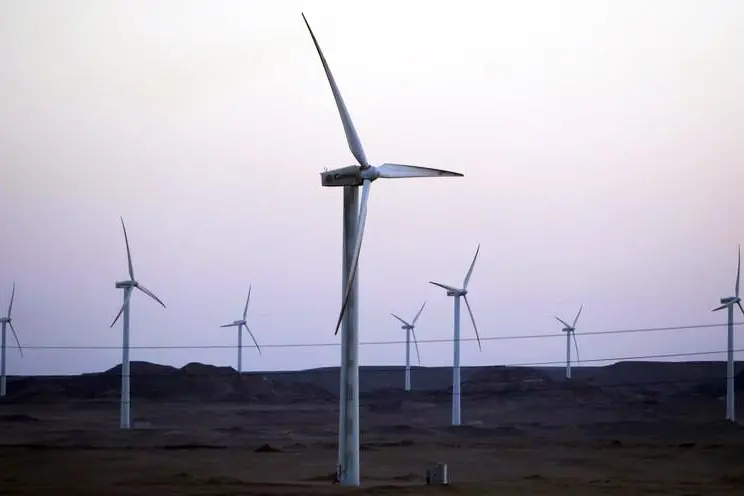PHOTO
Egypt has launched its first regulated voluntary carbon market for registering, issuing, and trading carbon reduction certificates, a significant step towards achieving economic and environmental sustainability, according to Rania Al-Mashat, Minister of Planning and Economic Development.
Al-Mashat, speaking at a conference announcing the completion of regulatory frameworks for carbon reduction projects at the Financial Regulatory Authority (FRA) headquarters in the Smart Village, said the launch signifies Egypt’s commitment to innovative policies for mitigating climate change.
“The establishment of this market is the result of collaboration between all relevant parties, including development partners,” Al-Mashat said. She highlighted the role of the Development Policy Financing Program, implemented by the Ministry with the World Bank, which has supported the launch through structural reforms and technical assistance for the FRA to issue three key decisions regarding local carbon markets.
These decisions cover registration requirements for accreditation and verification bodies, authorization requirements for specific carbon credit registrations, and authorization requirements for carbon credit registrations related to commercial matters.
The minister emphasised the continued implementation of the Development Policy Financing Program with the World Bank and other partners to drive structural reforms that promote a green transition.
Al-Mashat noted that the new carbon market will bolster Egypt’s regional leadership in the green economy.
Carbon markets, she explained, are effective tools that incentivize companies to reduce harmful emissions by providing “carbon credits,” which can be traded and sold to investors and companies struggling to curb their emissions. This mechanism not only reduces emissions but also provides financing for green transitions.
“Carbon markets are a key global mechanism for reducing greenhouse gas emissions, and they are also an innovative financing model recommended in the Sharm El-Sheikh Guide for Just Finance, specifically in its fourth chapter on blended finance, due to their role in generating financial returns that support climate action,” Al-Mashat said.
She also emphasised that the launch aligns with Egypt’s Vision 2030 and the National Climate Change Strategy 2050, aiming to strike a balance between economic and environmental development by mitigating the negative impacts of climate change while preserving economic growth. This initiative, Al-Mashat added, reflects Egypt’s leading role in supporting the Agenda 2063 for Africa, promoting environmentally sustainable regional economies and communities resilient to climate change.
The Minister highlighted the ‘NWFE’ program’s energy sector projects as one of Egypt’s pathways to achieving its national climate change strategy goals, aiming to reduce approximately 17 million tonnes of carbon dioxide emissions annually. In this regard, the Ministry collaborates with entities like the Transformative Carbon Asset Fund (TCAF), a World Bank initiative dedicated to reducing carbon emissions.
Al-Mashat stated that the carbon credit market launch is a key recommendation emphasised by development partners. The Climate Change and Development Report (CCDR) published by the World Bank Group in November 2022 included a recommendation to establish a carbon credit market as one of Egypt’s pathways to a low-carbon future. Similarly, the OECD report titled “Green Growth Policies in Egypt,” under the framework of implementing the national program with the government, recommended launching a carbon trading market on the Egyptian Exchange (EGX) as a positive step toward engaging the private sector in climate action and encouraging Egyptian companies to invest in mitigation projects.
To build upon this progress, the Ministry of Planning and Economic Development is continuing its collaboration with the World Bank on the Joint Capital Market Program (J-CAP), providing support to the FRA, the Ministry of Environment, and other national entities in strengthening the infrastructure to attract private capital in Egypt and enhance liquidity in the financial markets. This involves developing the necessary foundations for the local ecosystem, aiming to transform Egypt into a regional hub for carbon markets.
The Ministry is also coordinating with the European Union to implement various activities under the TAIEX “Technical Cooperation and Information Exchange” mechanism, providing technical support for the Carbon Border Adjustment Mechanism (CBAM) to relevant entities, including the Ministry of Industry and its affiliated organisations.
“Estimates indicate that carbon credit trading could reduce the cost of implementing nationally determined contributions by more than half, reaching up to $250bn by 2030 globally,” Al-Mashat said. She highlighted that launching a carbon market in Egypt will enable it to increase the green economy’s contribution to GDP, including boosting green investments and achieving targeted ratios in various aspects of the green economy.
Yasmine Fouad, Egyptian Minister of Environment, highlighted the driving force behind the launch: “The need to fulfil Egypt’s commitments under the Paris Agreement, the updated Nationally Determined Contributions (NDCs), and the targeted carbon emission reduction rates.”
Despite Egypt’s relatively small global carbon footprint, accounting for less than 1% of global emissions, and Africa’s share of less than 4%, Fouad stressed the importance of shared responsibility and the crucial role of the private sector.
She elaborated that there are two types of carbon markets. The voluntary carbon market, currently under development, is the product of a two-year regulatory process aimed at creating opportunities for the private sector. Businesses will be able to generate revenue through both renewable energy electricity sales and carbon certificate trading, she added.
This voluntary market, Fouad explained, is essential for building the foundation for a mandatory carbon market. The latter will involve identifying carbon reduction projects, calculating emissions across sectors, and establishing a robust Monitoring, Reporting, and Verification (MRV) system in partnership with government agencies and development banks.
© 2024 Daily News Egypt. Provided by SyndiGate Media Inc. (Syndigate.info).




















